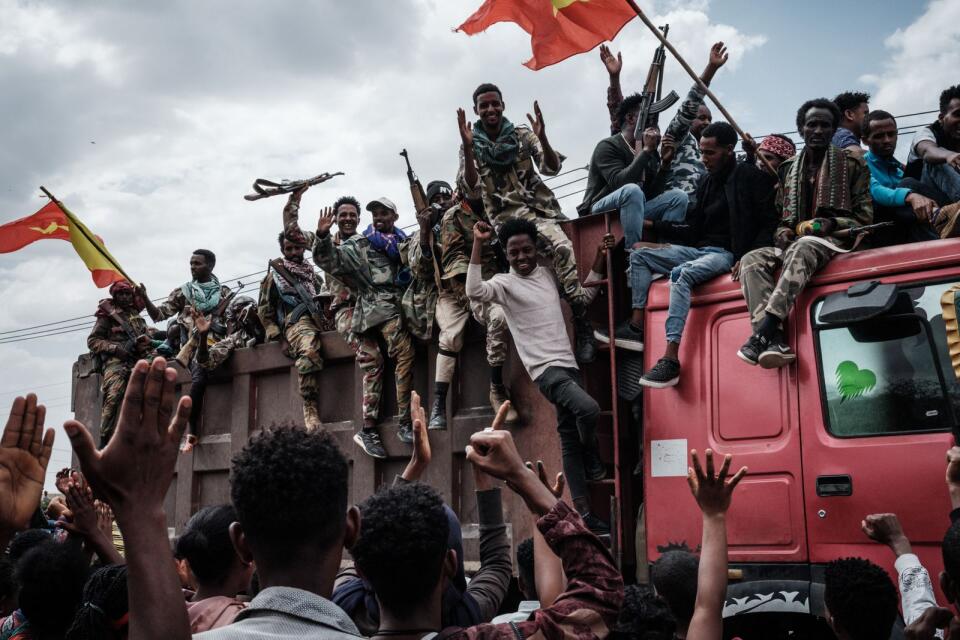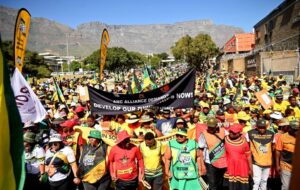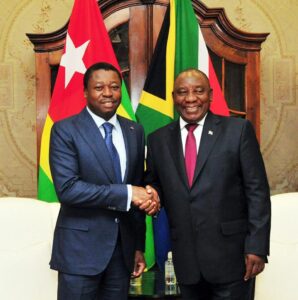Tigray People’s Liberation Front (TPLF) fighters react to people as they arrive on a truck in Mekele, the capital of Tigray region, Ethiopia. Tigrayan rebels agreed to a “cessation of hostilities” on February 25, 2022, a turning point in the nearly 17-month war in northern Ethiopia following the government’s announcement of an indefinite humanitarian truce a day earlier. – Picture Yasuyoshi Chiba / AFP / Taken on June 29, 2021
By Zekarias Beshah Abebe
Ethiopia’s transitional justice process, which began in November 2022, is entering a critical phase. The Ministry of Justice is poised to present a draft of the transitional justice policy — the first in the country’s history — to the Council of Ministers for deliberation and adoption in the coming weeks.
The policy aims to address current and past violations and grievances and aspires to steer the country toward lasting peace and democracy. While the guns have fallen silent in Tigray following the Pretoria Cessation of Hostilities Agreement, escalating violence in various parts of the country — notably Amhara and Oromia — are putting into question the feasibility of a transitional justice process, and the unresolved territorial disputes between Tigray and Amhara are raising the spectre of a conflict relapse.
Ethiopia has a complex history characterised by recurring human rights violations and conflicts, yet the establishment of a comprehensive transitional justice mechanism to systematically address the past has remained elusive.
Upon assuming power in 1991, the Ethiopian People’s Revolutionary Democratic Front (EPRDF) initiated the Red Terror Trials to address the egregious human rights violations committed by former officials of the Derg military regime between 1974 and 1991. The trials faced criticism for their punitive nature and the absence of complementary mechanisms such as truth-seeking, reconciliation and reparation.
The political reforms initiated after Prime Minister Abiy Ahmed came to power in April 2018 provided an opening to deal with past violence and grievances. Revisions were made to some laws that had been criticised for enabling human rights violations, accompanied by the acknowledgement of the violations committed by the pre-2018 EPRDF regime.
Additionally, in December 2018, the government established the Reconciliation Commission, which was given the mandate to address multi-layered grievances; identify and ascertain the nature, cause, and dimension of recurring gross human rights violations; and provide both victims and perpetrators a platform for truth-telling and acknowledgement. The commission, hampered by its poor design and limited political attention, concluded its three-year term in February 2022 without achieving any meaningful results.
Meanwhile, in November 2020, a bloody conflict erupted in Tigray in the northern part of the country, later spilling over to the neighbouring regions of Amhara and Afar. Investigations by the Ethiopian Human Rights Commission – Office of the United Nations High Commissioner for Human Rights (EHRC-OHCHR) and the International Commission of Human Rights Experts on Ethiopia discovered that all parties to the conflict, including the Ethiopian National Defence Forces, the Tigray and Amhara forces, and Eritrean Defence Forces, committed serious human rights and humanitarian law violations that may amount to crimes against humanity and war crimes.
On November 2, 2022, this conflict ended with the signing of the Pretoria Agreement between the Federal Government and Tigray People’s Liberation Front (TPLF). The agreement, under article 10(3), envisions that the Ethiopian government will implement “a comprehensive national transitional justice policy aimed at accountability, ascertaining the truth, redress for victims, reconciliation, and healing, consistent with the Constitution of FDRE [Federal Democratic Republic of Ethiopia] and the African Union Transitional Justice Policy Framework”.
The agreement further states that the transitional justice policy shall be developed with inputs from all stakeholders and civil society groups through public consultations and formal national policy making processes.
Against this backdrop, the Ethiopian Ministry of Justice established the Transitional Justice Working Group of Experts in November 2022, marking the official beginning of the country’s current transitional justice (TJ) process. Comprised of 13 independent experts from diverse backgrounds, the Working Group is mandated to conduct public consultations and craft a national TJ policy.
Subsequently, in January 2023, the Working Group released a green paper on transitional justice policy options, providing an analysis of alternative policy options to pursue the different TJ pillars: prosecution, truth-seeking, reconciliation, amnesty, reparations, and institutional reform. The process encompasses mechanisms aimed at promoting truth, facilitating access to justice, providing reparations, and ensuring non-recurrence.
Over the next eight months, the Working Group convened some 80 consultations nationwide, focusing on the policy options outlined in the green paper. The consultations involved a broad spectrum of stakeholders, ranging from victims and vulnerable groups to civil society actors, political parties, experts, and government officials. In February 2024, the Working Group concluded its mandate with the submission of a comprehensive report detailing the views and aspirations of participants, along with key policy recommendations.
Similar reports were released by EHRC-OHCHR and the Harvard Humanitarian Initiative. A zero draft of the TJ policy was also submitted to the Ministry of Justice, which is now in charge of finalizing the draft for submission to the Council of Ministers for consideration and adoption. It remains unclear whether there is the intention to present the policy to the House of Peoples’ Representatives for final approval, as recommended by the Working Group.
The Ministry convened four validation workshops from February 21 to February 24 to deliberate on the draft TJ policy with select stakeholders. Strangely, the validation workshops were conducted without sharing the draft policy with the participants, prompting a coalition of civil society organisations (CSOs) to urge the government to release the draft for public discussion and scrutiny.
The draft policy focuses on TJ pillars and crosscutting issues, further highlighting the role of regional states, federal government offices, and civil society actors in the implementation process. It appears that the majority of the recommendations put forth by the Working Group have been incorporated into the draft policy.
The temporal scope for prosecution under the policy covers crimes since 1995, the year that Ethiopia’s current federal constitution was adopted. In contrast, for truth-seeking, reconciliation, and reparation, the draft policy maintains an open-ended temporal scope, stretching back as far as information and evidence permit.
This expansive approach underscores the broader temporal and territorial scope envisioned by the TJ policy, despite the fact that the process is often linked to the Tigray conflict. Sceptics argue that a TJ process designed to be so expansive will “serve none”, while others contend that it risks advancing “reconciliation without accountability”. Yet in a context where different communities have experienced violations and grievances during different periods, a more limited scope would raise legitimate questions around “whose justice matters”. It is also questionable whether a limited scope would serve the ultimate objective of achieving lasting peace in the country.
Despite the progress made thus far, challenges still abound. One of the primary challenges remains the ongoing conflict between armed groups and government forces in Amhara and Oromia, the two largest regional states in Ethiopia. These dynamics not only cast doubt on the government’s commitment to the transitional justice initiative but also obstruct its effective implementation.
Some of the public consultations on transitional justice were cancelled due to the prevailing security conditions, highlighting their adverse impacts on the overall process. Beyond the ongoing deadly insurgencies, the contested territories between the Amhara and Tigray regions may trigger another cycle of violence. Clashes between forces from the two regions in the disputed area of Raya were reported in February and March.
There are critical voices from Tigray on the design of the TJ policy and what accountability should look like. The Tigray Interim Administration, established under the Pretoria Agreement until elections are held, has consistently aired its concerns regarding the initiative, demanding participation on equal footing with the federal government in the policy’s design and implementation.
Reports from the Working Group and EHRC-OHCHR highlight how prevalent this sentiment is within Tigray, where a majority of participants in the public consultations expressed their preference for internationally led or hybrid accountability mechanisms. This sentiment underscores a deep mistrust in the credibility and effectiveness of the domestic justice system. Moreover, preference for an international mechanism is also driven by the need to ensure accountability for the atrocities committed by Eritrean forces.
However, holding foreign perpetrators accountable before domestic courts presents more of a procedural challenge than a jurisdictional one, as the crimes were committed within Ethiopian territory.
In contrast, most participants in the public consultations from other regions suggested the establishment of a “special court”. The compromise proposed by the Working Group involves creating such a domestic court with meaningful participation from foreign experts. Nonetheless, the draft TJ policy, as presented during the validation workshop, omitted the international element from the accountability track — a major deviation from the recommendations outlined in the Working Group’s report.
It is imperative for the TJ policy to devise an institutional framework that garners confidence across all segments of society, particularly within affected communities. In this context, considering that addressing violations arising from the northern conflict is an objective of the TJ process, securing Tigray’s political buy-in will be an important factor for the success of the process.
Another notable challenge stems from the lack of strong CSOs. A practice brief published by the Centre for the Study of Violence and Reconciliation (CSVR) emphasises the indispensable role of CSOs in a transitional justice context, as they often act as “service providers” and “watchdogs” to ensure transitional justice measures are focused on proposed objectives. Whether or not civil society engagement is active and organised is a big factor in whether or not the TJ process will succeed, as CSOs play a wide variety of roles throughout the process, from sensitisation to vigilant monitoring.
Yet, CSOs often find themselves weakened and in disarray within transitional justice settings as they emerge from the country’s violent or authoritarian past. Years of crackdowns on CSOs following the enactment of the highly restrictive and repressive Proclamation 621/2009 have significantly undermined their capacity. Although this law was replaced by a more progressive CSO Proclamation in 2019, the enduring impact of the past decade of repression can still be felt, affecting the capacity of CSOs as well as their interactions with the state.
Despite their limitations, existing CSOs are making efforts to organise and enhance the role they play in the TJ process. Some are considering the formation of a network specifically dedicated to transitional justice, while others are conducting studies to identify strategic areas for effective intervention.
Meanwhile, other CSOs hesitate to fully engage in the process, as they harbour doubts about the government’s commitment to a credible TJ process and are thus wary of being manipulated into legitimising what critics consider a “farce”, “flawed”, and a “quasi-compliance” process. In the next stages of the TJ process, it will be important to provide technical and financial support to CSOs in order to enhance their capacity and create space for their meaningful engagement.
Finally, there are concerns about the timing for pursuing criminal accountability. The draft TJ policy envisages criminal prosecution against those bearing the greatest criminal responsibility, with the subject matter jurisdiction limited to gross human rights violations such as war crimes and crimes against humanity. As highlighted in the reports of the joint EHRC-OHCHR and the Working Group, participants of the public consultations on transitional justice emphasised that the main focus of accountability should be on the most responsible perpetrators, particularly high-ranking officials.
However, the challenge lies in how to pursue criminal prosecution in a context where alleged perpetrators from all sides either hold power or wield significant political clout behind the scenes. This predicament is further compounded by the highly charged ethnic tensions within the country’s political environment. In this context, pursuing accountability will be challenging and could potentially trigger violence. This does not mean advocating for impunity, but pragmatism dictates careful consideration of timing and approach.
A United Nations Secretary-General’s guidance note from 2010 on transitional justice asserts that the question is not about whether to pursue accountability and justice but rather “when” and “how”. It further states that the “nature” and “timing” of accountability should be framed within the context of international obligations, while the national context and the views of national stakeholders must also be considered.
Similarly, the 2019 African Union Transitional Justice Policy notes that “the promotion and pursuit of the interrelated but at times competing TJ objectives in a transitional setting often necessitates sequencing and balancing”. In the interim, pending the establishment of favourable conditions for pursuing accountability, strategic preparatory work such as addressing legal gaps to enable the prosecution of serious human rights violations can be undertaken while implementing other pillars of transitional justice, such as truth-seeking and institutional reform.
An important step would be to create a greater link between transitional justice and other national initiatives, such as the National Dialogue. In a deeply polarised country, transitional justice could benefit from consensus-building that comes through national dialogue, but the latter remains equally contested.
Widespread scepticism toward the TJ process persists, with many viewing it as potentially manipulated by the government for political ends. Failure to engage with critical voices and address prevailing challenges could jeopardise the process, causing Ethiopia to miss a rare opportunity to move beyond its history of violence and authoritarianism.
Zekarias Beshah Abebe is a Non-Resident Senior Researcher at Amani Africa.
This article was first published on Global Observatory




